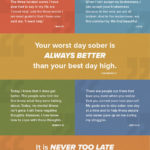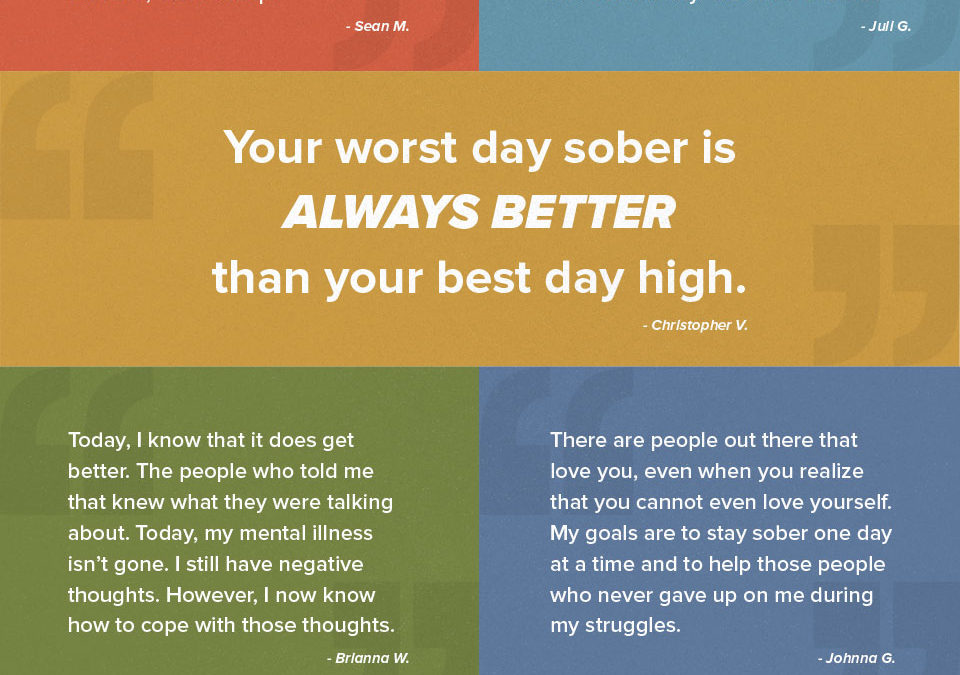Okay, so you relapsed. Or a loved one relapsed. You’re worried and scared things are going to go back to being like they were before. You worked so hard to get clean the first time, and now you wonder if it’s worth trying again … if it’s even possible to try again.
Before your thoughts spin out of control, stop and breathe. This isn’t the time to give up. It’s time to put things in perspective. It’s time to reflect, act rather than react, and come back stronger than ever.
Is It Worth It?
When we feel defeated, it’s easy to wonder if our goals, no matter what they are, are worth it. However when it comes to sobriety, you know. You know you want it, and you know it’s worth it. You know addiction is miserable. And exhausting. And lonely. Active addiction is more work than recovering will ever be. So even though there’s the voice in your head saying, “Why bother?” and, “Isn’t this easier?” Well, you know why you bother. You know it isn’t easier. Addiction takes, and it keeps taking.
Life in recovery may be hard at first, but it only gets better and easier — This is a fact! Psychology Today explains that the longer you’re sober, the more likely you are to stay sober. Why? Because recovery is worth it, and the longer you live a sober life, the more you want to hold on to it. So dust yourself off, stop looking for excuses to give up (because there aren’t any!), and put your relapse into perspective.
A Little Perspective On Relapse
It’s easy to see relapse as a personal failure. However relapse isn’t unique to you — and it definitely isn’t an end to recovery! Lots of people relapse. They relapse in addiction, and they relapse in other chronic health diseases. The National Institute on Drug Abuse (NIDA) tells us, “The chronic nature of the disease means that relapsing in addiction at some point is not only possible, but likely. Relapse rates (i.e., how often symptoms recur) for people with addiction and other substance use disorders are similar to relapse rates for other well-understood chronic medical illnesses such as diabetes, hypertension and asthma.” So if you’ve relapsed, you aren’t the only one out there.
If you haven’t already, talk with peers in recovery. Go to a support group meeting. Listen to how many people have stories of taking two, three or many more times to “get it right.” Listen to how they learned from each relapse, how they didn’t give up, and how you can do the same. Relapse isn’t a personal failure, a sign of weakness or an indicator that you can never stay sober. It’s just part of the disease! Get back into treatment, learn why you relapsed and how you can prevent it, and keep moving forward.

Why Does Relapse Happen?
So now you know relapse happens. You know it’s not a reason to blame yourself or give up. Then why does it happen? We all have our unique triggers, cravings, and reasons for setbacks, but these have similar roots. NIDA steps in again to tell us, “Treatment of chronic diseases involves changing deeply embedded behaviors, and relapse does not mean treatment has failed. For a person recovering from addiction, lapsing back to drug use indicates that treatment needs to be reinstated or adjusted or that another treatment should be tried.”
Drug use changes how our brains work. We develop new routines, thought patterns, habits and more. Addiction recovery requires a lot of (good) change to undo this, and this change takes time. It takes practice. It takes learning what works for you and what doesn’t. With personal and professional support, you can learn the real reasons behind your relapse and how you can take action to make your recovery stronger.
Act, Don’t React
When you relapse, your first thoughts are going to be negative, emotional and hardly rational. There will be the desire to just throw all the work you’ve done out the window and give up. It’s perfectly fine to think and feel this way at first, just don’t let it dictate how you act! Look at these thoughts. Acknowledge them and see where they’re coming from — and then tell them to shut up. Rather than react, act. Take the next steps that you know are the right ones: talking to peers, talking to professionals, getting right back up on your feet and back into treatment.
So What Is a Relapse?
A relapse isn’t a failure. It isn’t a personal defeat. It isn’t the end, and maybe it isn’t even a midpoint for you. So what is a relapse? It’s a reason to come back strong. It’s a learning opportunity. It’s a starting point. It’s a time to reevaluate where you are and where you want to be. It’s a reason to find help, find more help or find different help this time around. When you stand back up and reach back out after a relapse, a relapse simply becomes a part of your recovery. And every part of recovery is worth it when it leads to that long, healthy and sober life you know you can achieve!
By Alanna Hilbink
A writer for Heroes in Recovery.
Heroes in Recovery has a simple mission: to eliminate the social stigma that keeps individuals with addiction and mental health issues from seeking help, to share stories of recovery for the purpose of encouragement and inspiration, and to create an engaged sober community that empowers people to get involved, give back, and live healthy, active lives.
Jean Krisle is a motivational keynote speaker, extraordinary fast-lane leader, and the CEO/Founder of 10,000 Beds, Inc. a 501c3 nonprofit organization. The mission of 10,000 Beds is to connect those seeking help for addiction to those who are willing to help by providing addiction treatment scholarships.
Jean connects with audiences to provide inspiration to leaders, clients, teams and organizations. She focuses on fast-lane leadership – a compilation of proven steps to taking the FastLane2Success and the reality of success often following failure. Her popular Keynote Presentation “Failing2Win: The Paradox of Success” instantly engages the audience with identifiable stories and experiences with a strong call to action as she challenges her audience participants to push themselves harder and higher.
Jean and her husband Hal have spent much of 2017 and 2018 #OnTheRoad4Recovery to elevate awareness around addiction, change perceptions of recovery, and inspire fast-lane leadership. You can reach Jean at jean@10000beds.org. You can support 10,000 Beds at 10000beds.org. #onebedonelife #failing2win #fastlaneleadership #fastlaneleaders #ethicsdoneright #fastlane2success

